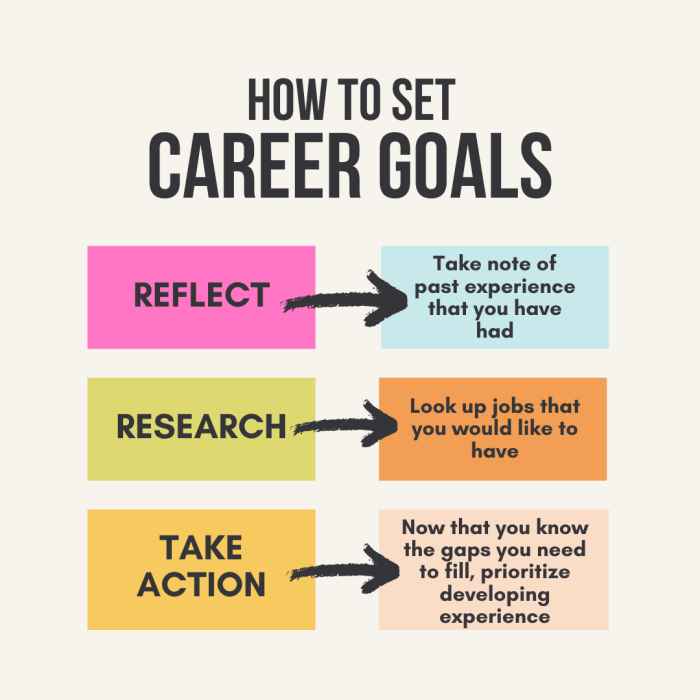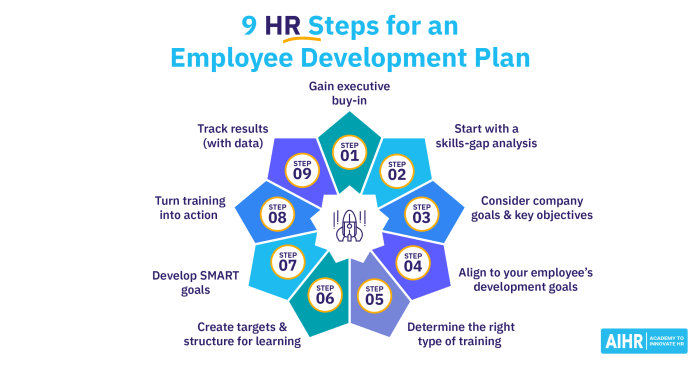Career Development Goals, a pivotal aspect of professional growth, are key to unlocking success in your career journey. By setting clear objectives and aligning them with personal values, individuals can pave the way for a fulfilling and rewarding career path.
In this guide, we will explore the significance of career development goals, strategies for effective goal-setting, implementing actionable plans, and overcoming challenges along the way. Get ready to supercharge your career with these essential insights!
Importance of Career Development Goals

Setting clear career development goals is crucial for professional growth as it provides individuals with a roadmap to success. By having well-defined goals, individuals can focus their efforts, make informed decisions, and track their progress in their career journey.
Enhanced Job Satisfaction
- Having clear career goals can enhance job satisfaction by providing a sense of purpose and direction in one’s career.
- When individuals know what they are working towards, they are more motivated and engaged in their work, leading to increased job satisfaction.
- Achieving milestones and objectives set in career development goals can create a sense of accomplishment and fulfillment, further boosting job satisfaction.
Motivation and Focus
- Career development goals help individuals stay motivated and focused by giving them a clear target to aim for.
- When faced with challenges or setbacks, having career goals provides individuals with the resilience to keep pushing forward towards their objectives.
- By continuously working towards their career goals, individuals can maintain a sense of purpose and direction, staying motivated to overcome obstacles and achieve success.
Setting Effective Career Development Goals
Setting effective career development goals is crucial for success in the professional world. By following specific strategies and aligning these goals with personal values and long-term aspirations, individuals can create a roadmap for their career growth. Breaking down long-term goals into manageable short-term objectives ensures progress and motivation along the way.
Strategies for Setting SMART Career Development Goals
- Specific: Clearly define the goal you want to achieve, such as “Increase sales by 20%.”
- Measurable: Establish criteria to measure progress, like “Track monthly sales reports.”
- Achievable: Set realistic goals that are within reach based on your current skills and resources.
- Relevant: Ensure that the goal aligns with your career aspirations and contributes to your overall growth.
- Time-bound: Set a deadline for achieving the goal, providing a sense of urgency and accountability.
Importance of Aligning Career Goals with Personal Values and Long-Term Aspirations
Aligning career goals with personal values and long-term aspirations provides a sense of purpose and fulfillment in your work. When your goals resonate with what truly matters to you, you are more motivated to work towards them consistently.
Tips for Breaking Down Long-Term Career Goals into Manageable Short-Term Objectives
- Divide long-term goals into smaller milestones to track progress effectively.
- Set specific actions for each short-term objective to keep yourself focused and on track.
- Regularly review and adjust your short-term objectives based on your progress and changing circumstances.
Implementing Career Development Plans
Now that you have set your career goals, it’s time to put them into action by implementing your career development plans.
Difference between Career Goals and Career Development Plans, Career Development Goals
While career goals are the specific achievements you aim to reach in your career, career development plans Artikel the steps and strategies you will take to reach those goals.
Creating a Detailed Career Development Plan
- Identify your long-term career goals and break them down into smaller, manageable milestones.
- Assess your current skills, experiences, and qualifications to determine what areas you need to improve or develop.
- Research potential training programs, courses, certifications, or workshops that can help you enhance your skills and knowledge.
- Set a timeline for each milestone and establish specific actions you need to take to achieve them.
- Regularly track your progress, evaluate your achievements, and make adjustments to your plan as needed.
Revisiting and Adjusting Career Development Plans
As your career goals evolve over time, it’s essential to revisit and adjust your career development plans to stay aligned with your aspirations.
Flexibility is key in adapting your plan to new opportunities and changes in the industry.
Overcoming Challenges in Achieving Career Development Goals

When pursuing career development goals, individuals often face various obstacles that can hinder their progress. It is essential to have strategies in place to overcome setbacks and maintain resilience in the face of challenges.
Identifying Common Obstacles
Common obstacles individuals face when pursuing their career development goals include:
- Lack of Skills or Qualifications: Sometimes, individuals may lack the necessary skills or qualifications required to progress in their desired career path.
- Work-Life Balance: Balancing work responsibilities with personal life can be challenging and may impact one’s ability to focus on career development.
- Financial Constraints: Financial limitations can hinder individuals from pursuing further education or training opportunities.
- Lack of Opportunities: Limited access to career advancement opportunities or job openings in desired fields can be a significant obstacle.
Strategies for Overcoming Setbacks
To overcome setbacks and stay resilient, individuals can consider the following strategies:
- Continuous Learning: Engaging in continuous learning and skill development can help individuals stay relevant and competitive in the job market.
- Networking: Building a strong professional network can provide valuable support and open up new opportunities for career growth.
- Seeking Mentorship: Having a mentor who can provide guidance and advice can be instrumental in navigating challenges and making informed career decisions.
- Adapting to Change: Being flexible and adaptable to changes in the industry can help individuals overcome obstacles and seize new opportunities.
Role of Mentorship and Support Systems
Mentorship and support systems play a crucial role in helping individuals navigate roadblocks in their career journeys. These support systems can provide:
- Guidance and Advice: Mentors can offer valuable insights and guidance based on their own experiences.
- Emotional Support: Having a support system in place can help individuals stay motivated and resilient in the face of challenges.
- Networking Opportunities: Mentors and support systems can facilitate networking opportunities and connections that can aid in career advancement.